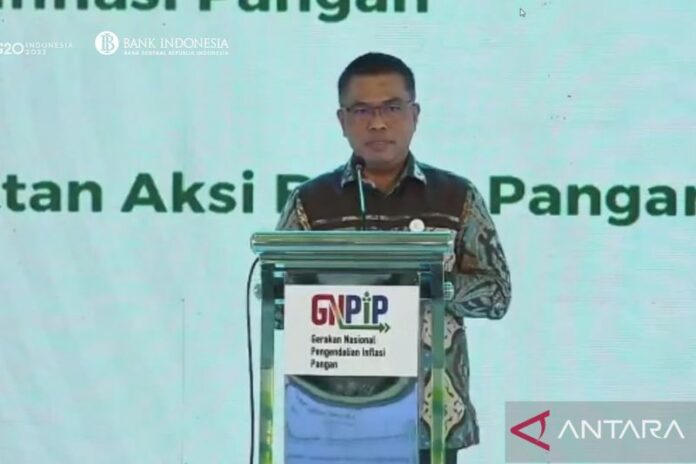The National Food Agency has remained vigilant about food supply amid the challenges of a global recession and a potential food crisis, Deputy for Food Availability and Stabilization at the agency I Gusti Astawa said.”
We must be vigilant, we must not be fixated on proverbs as if our area is fertile, even though the real conditions on the ground are that there are areas that are in surplus, and there are areas that are in deficit. This is our collective role,” he remarked at the launch of the South Sulawesi Food Inflation Control National Movement (GNPIP), which was followed from Jakarta on Monday.
He said that currently, the availability of rice in Indonesia is sufficient for the next 88 days, the supply of corn is sufficient for the next 52 days, red onions 39 days, large chilies 12 days, beef 82 days, broiler meat 62 days, sugar consumption 149 days, and cooking oil 77 days.
Meanwhile, soybeans stocks are expected to be sufficient for the next seven days, so it is necessary to pay attention to the addition of supplies, especially for tofu and tempeh craftspersons.
According to him, the government needs to have sufficient food reserves so that food prices are not controlled by speculators.
“There are five types of food reserves that need to be maintained, namely the food reserves of the central government, provincial governments, district or city governments, village governments, and the community,” he said.
The National Food Agency also is continuing to strive so that the State Logistics Agency (Bulog) can absorb farmers’ production to meet government reserves. Currently, Bulog has a supply of around 700 tons of rice, which needs to be augmented.
“Currently, we are fixing the Presidential Regulation (Presidential Regulation) on food reserves. We will manage three main commodities whose reserves we will manage, namely rice, corn, and soybeans, so that the reserves are controlled by Bulog to control prices,” he said.
Astawa expressed the hope that the efforts made by the government will keep the inflation rate from exceeding the rate of economic growth.
“We are also mobilizing food supplies from areas that are experiencing a surplus to areas that are experiencing a deficit,” he said.
President Joko Widodo (Jokowi) earlier urged households to utilize the front yards of their homes to plant foods, such as chillies, to reduce the impact of the ongoing food crisis on their family’s food needs.
“Regarding chilli, households in villages ought to plant chilli, either in polybags or in their front yards, so there will be no longer chilli scarcity or a sudden surge in chilli prices,” he said while observing and planting dwarf coconuts in Giriroto Village, Boyolali District, Central Java, on Thursday, according to a statement received here the same day.
According to the President, the current global food crisis has been caused by ongoing global conflicts that have disrupted the food supply, with at least 300 million people in various countries facing food shortages and famine.
If no solutions are conceived to address the issue, the population affected by the global food crisis could reach up to 800 million, he cautioned.
Besides urging households to produce their own food, Widodo also advised them to utilize unused lands for planting foods, such as dwarf coconuts.
Dwarf coconuts can be processed into various food products, such as coconut sugar and drinks once the coconuts are harvested 2–2.5 years after planting, he pointed out.
“In a year, a coconut tree can produce up to 180 coconuts that can be made into ant sugar, coconut, oil, and sold as whole fruit (or) as a fresh drink,” he said.








